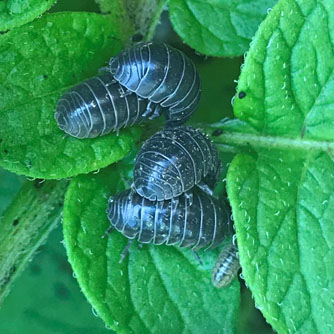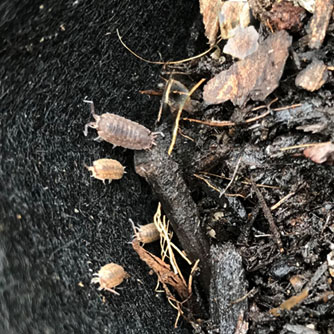Slaters
BackSlaters are common critters found in gardens lurking under rocks, mulch and other damp protected areas and emerging at night to feed. They belong to the crustacean family and have distinctly segment bodies. There are several different species which are typically grey in colour but some may also be black or a greyish brown. Most will grow to about 1cm long.
Slaters are also known by other names including woodlouse, woodlice, pillbugs, butcher boys, roll ups and roley poleys. Some will roll up into a ball as a defence mechanism which explains a few pf those common names.
In small numbers slaters are actually good guys as they mostly feed on moss, algae, fungi and dead or dying plant matter. So don't be alarmed if you see the odd one here or there. They are just helping recycling nutrients in your garden.
However if slaters build up into large numbers problem can develop as they start attacking healthy plants and some fruits.

Slaters congregating on a young plant
Plants Attacked by Slaters
Tender young seedlings are particularly vulnerable with the sections close to the ground most commonly eaten. Ripening fruit that is also close to the ground, like strawberries, can be munched on.
More generally any stem, leaf, fruit or vegetable that has been damaged by something else (like another insect, bird, possum etc..) can become a feeding opportunity for slaters creating further damage.
In glasshouses and shadehouses the extra moisture attracts slaters and they are commonly discovered under pots. If their numbers get high they can start feeding on the roots of potted plants and young shoots emerging from the potting mix. Orchid roots may be particularly favoured.

Slaters foraging for food amongst potting mix
How To Organically Control Slaters
- Sprinkle OCP eco-shield pellets around plants which need protection. Reapply as required eg after heavy rains or if all pellets get eaten but the damage continues.
- Clean up areas around the garden which may provide hiding places for them.
- Remove thick layers of mulch if the problem is persistent with young seedlings. Mulch can be returned once seedlings have grown.

Use OCP eco-shield to protect seedlings and other plants against slater damage


